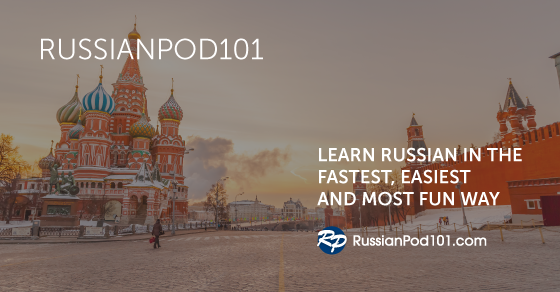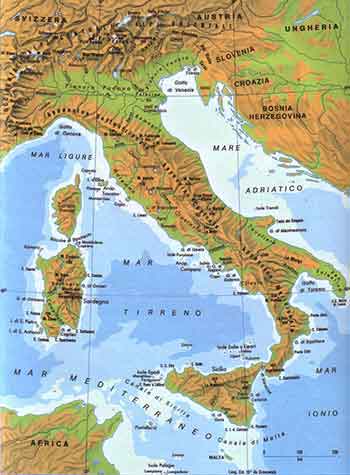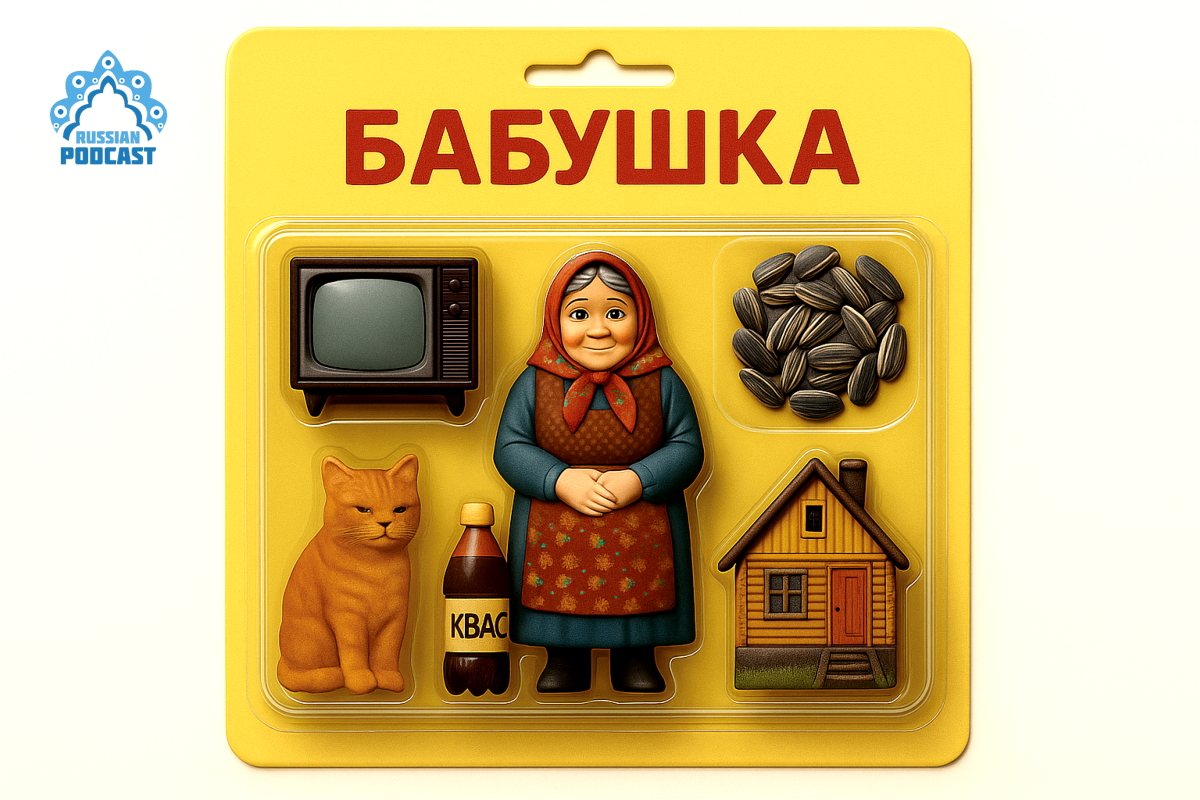| Welcome to Can-Do Russian by RussianPod101.com. |
| In this lesson, you’ll learn how to use parting expressions in Russian. |
| For example, “Goodnight” is |
| Спокойной ночи. (Spokoynoy nochi.) |
| Marina Maslova is talking with her former colleague, Rose Reznikova . |
| As Marina says goodbye, her children join her in saying goodnight. |
| Before you hear their conversation, let’s preview some of its key components. |
| До скорого! (Do skorogo!) |
| “See you soon!” |
| До скорого! |
| До скорого! |
| Спокойной ночи. (Spokoynoy nochi.) |
| “Goodnight” |
| Спокойной ночи. |
| Спокойной ночи. |
| Доброй ночи! (Dobroy nochi!) |
| “Goodnight” |
| Доброй ночи! |
| Доброй ночи! |
| До встречи. Пока! (Do vstrechi. Poka!) |
| “See you. Bye!” |
| До встречи. Пока! |
| До встречи. Пока! |
| Focus on the way each person says goodbye. |
| До скорого! (Do skorogo!) |
| Спокойной ночи. (Spokoynoy nochi.) |
| Доброй ночи! (Dobroy nochi!) |
| До встречи. Пока! (Do vstrechi. Poka!) |
| Once more with the English translation. |
| До скорого! (Do skorogo!) |
| “See you soon!” |
| Спокойной ночи. (Spokoynoy nochi.) |
| “Goodnight.” |
| Доброй ночи! (Dobroy nochi!) |
| “Goodnight!” |
| До встречи. Пока! (Do vstrechi. Poka!) |
| “See you. Bye!” |
| Let’s break down each of these expressions. |
| First, do you remember how Milena says, |
| “See you soon!” |
| До скорого! (Do skorogo!) |
| This starts with до (do), meaning “until.” До . До. |
| Next is скорого (skorogo), meaning something like “upcoming,” in this context. Скорого . Скорого. |
| Note скорого (skorogo) is from скорый (skoryy), meaning “upcoming.” Скорый (Skoryy). |
| Together, до скорого (do skorogo) means something like “until the upcoming,” but translates as “See you soon.” |
| До скорого! (Do skorogo!) |
| Note, до скорого (do skorogo) is a shortened form of the expression до скорого свидания (do skorogo svidaniya) literally “until upcoming appointment,” but translates as “until the coming appointment.” До скорого свидания (Do skorogo svidaniya). |
| When using this expression, свидание (svidaniye), “appointment,” is usually omitted. До скорого! (Do skorogo!) |
| До скорого (Do skorogo) is fairly informal, which indicates a close relationship between Milena and Rose Reznikova , her former colleague. |
| Do you remember how Marina says, |
| “Goodnight.” |
| Спокойной ночи. (Spokoynoy nochi.) |
| “Goodnight.” Спокойной ночи. |
| Спокойной ночи (Spokoynoy nochi), literally means “[have a] restful night.” Спокойной ночи . |
| Спокойной ночи. (Spokoynoy nochi.) |
| And do you remember how Mikhail says, |
| “Goodnight.” |
| Доброй ночи! (Dobroy nochi!) |
| “Goodnight!” Доброй ночи! |
| Доброй ночи (Dobroy nochi), literally “[have a] Goodnight,” but it translates as “Goodnight.” |
| Доброй ночи! |
| Both expressions used by Marina and Mikhail are used to say goodnight to Rose. |
| You use спокойной ночи (spokoynoy nochi), “Goodnight,” when you don’t plan on seeing someone again that night, and when someone is about to go to bed. It’s like saying “have a goodnight’s sleep.” It’s very informal, and rather used with people you are close to. |
| Do you remember how Rose says? |
| “See you. Bye!” |
| До встречи. Пока! (Do vstrechi. Poka!) “See you. Bye!” До встречи. Пока! |
| First is до встречи (do vstrechi), “See you.” До встречи. |
| This starts with до (do), which means “until” in this context. До . До. |
| After this is встречи (vstrechi), “meeting.” Встречи . Встречи. |
| Together, До встречи (Do vstrechi), literally “until meeting [you again],” but translates as “See you.” |
| Note: До встречи (Do vstrechi) is an informal parting greeting, and you should avoid it in a formal situation. |
| Next is пока (poka), “bye.” Пока . Пока. |
| All together, До встречи. Пока! (Do vstrechi. Poka!) “See you. Bye!” |
| До встречи. Пока! (Do vstrechi. Poka!) |
| This sentence is informal. Rose uses this to say goodbye to everyone. She’s the most senior person in the conversation, and she uses informal language to sound friendly. |
| The following expressions are used when you expect to see the person, or people, again in the near future, such as this week or the following week: |
| До встречи (Do vstrechi), “See you.” |
| До скорой встречи (Do skoroy vstrechi), “See you soon.” |
| Увидимся (Uvidimsya), “See you.” |
| When parting, it’s not unusual for speakers to add an additional good-bye phrase to their parting greeting. For example, |
| Всего доброго (Vsego dobrogo) or Всего хорошего (Vsego khoroshego), literally “all of good,” but it translates as “all the best.” |
| Бывай здоров(а) (Byvay zdorov(a)), literally, “be healthy,” but it translates as “take care.” |
| Note: Бывай здоров, is kind of old-fashioned, and it’s often shortened to бывай (byvay). |
| There is an interesting Russian expression worth mentioning: Прощай (Proshchay), meaning “farewell.” You use this phrase when you do not expect to see someone ever again. |
| In colloquial language, Russians often add давай (davay) to good-bye phrases. |
| For example, Давай, пока (Davay, poka). “Bye.” Давай, пока . |
| Literally, давай is a command meaning “give.” Adding давай (davay) does not change the meaning of the greeting. |
| Let’s look at some examples. |
| Listen and repeat or speak along with the native speaker. |
| До скорого! (Do skorogo!) |
| “See you soon!” |
| До скорого! (Do skorogo!) |
| Спокойной ночи. (Spokoynoy nochi.) |
| “Goodnight.” |
| Спокойной ночи. (Spokoynoy nochi.) |
| До встречи. (Do vstrechi.) |
| “See you.” |
| До встречи. (Do vstrechi.) |
| Пока! (Poka!) |
| “Bye!” |
| Пока! (Poka!) |
| Доброй ночи! (Dobroy nochi.) |
| “Goodnight!” |
| Доброй ночи! (Dobroy nochi.) |
| До свидания. (Do svidaniya.) |
| “Goodbye.” |
| До свидания. (Do svidaniya.) |
| Did you notice the last parting expression? |
| До свидания. (Do svidaniya.) |
| “Goodbye.” |
| This starts with до (do), “until” in this context. До. |
| Next is свидания (svidaniya). “Appointment.” Свидания . Свидания. |
| Together it’s до свидания (Do svidaniya), “goodbye.” До свидания.. До свидания. |
| You can use this greeting in all situations, no matter if you plan to meet the person again or not. It can be used in formal and informal situations. |
| До свидания (Do svidaniya). |
| Let’s review. |
| Respond to the prompts by speaking aloud. Then repeat after the native speaker, focusing on pronunciation. |
| Ready? |
| Do you remember how to say, |
| “See you soon!” |
| До скорого! (Do skorogo!) |
| До скорого! (Do skorogo!) |
| And how Marina says, |
| “Goodnight.” |
| Спокойной ночи. (Spokoynoy nochi.) |
| Спокойной ночи. (Spokoynoy nochi.) |
| Do you remember how Mikhail says, |
| “Goodnight.” |
| Доброй ночи. (Dobroy nochi.) |
| Доброй ночи. (Dobroy nochi.) |
| Do you remember how to say, |
| “See you.” |
| До встречи. (Do vstrechi.) |
| До встречи. (Do vstrechi.) |
| And how to say, |
| “Bye!” |
| Пока! (Poka!) |
| Пока! (Poka!) |
| Do you remember how to say, |
| “See you. Bye!” |
| До встречи. Пока! (Do vstrechi. Poka!) |
| До встречи. Пока! (Do vstrechi. Poka!) |
| Let’s practice. |
| Imagine you’re Miroslav Maslov , and you’re talking with Rose Reznikova . |
| Respond by saying “Goodnight.” |
| Ready? |
| До встречи. Пока! (Do vstrechi. Poka!) |
| Спокойной ночи. (Spokoynoy nochi.) |
| Listen again and repeat. |
| Спокойной ночи. (Spokoynoy nochi.) |
| Спокойной ночи. (Spokoynoy nochi.) |
| Let’s try another. |
| Imagine you’re Mikhail Maslov , and you’re finishing class. |
| Respond by saying “Bye!” |
| Ready? |
| Пока. (Poka.) |
| Пока! (Poka!) |
| Listen again and repeat. |
| Пока! (Poka!) |
| Пока! (Poka!) |
| Let’s try one more. |
| Imagine you’re Marina Maslova , and you’re finishing coffee with your college friend, Natalia . |
| Respond by saying “See you.” |
| Ready? |
| До скорого! (Do skorogo!) |
| До встречи. (Do vstrechi.) |
| Listen again and repeat. |
| До встречи. (Do vstrechi.) |
| До встречи. (Do vstrechi.) |
| In this lesson, you learned how to use basic parting greetings in Russian. This plays an essential role in the larger skill of using basic greetings. Let’s review. |
| Do you remember the polite way to say “Hello?” |
| Здравствуйте (Zdravstvuyte) |
| Здравствуйте (Zdravstvuyte) |
| Do you remember how to say, “Good evening?” |
| Добрый вечер. (Dobryy vecher.) |
| Добрый вечер. (Dobryy vecher.) |
| Imagine you’re Marina Maslova , and you’re meeting your friend Natalia Ivanova in the morning, after a short small talk you part your ways. |
| Do you remember the informal way to say “Hello?” |
| Привет! (Privet!) |
| Привет! (Privet!) |
| Respond to your friend Natalia greeting you first. |
| Привет! (Privet!) |
| Привет! (Privet!) |
| Listen again, and repeat. |
| Привет! (Privet!) |
| Привет! (Privet!) |
| And do you remember how to say “Bye?” |
| Пока! (Poka!) |
| Пока! (Poka!) |
| Respond to Natalia Ivanova . |
| Пока. (Poka.) |
| Пока! (Poka!) |
| Listen again, and repeat. |
| Пока! (Poka!) |
| Пока! (Poka!) |
| Well done! This is the end of the lesson and the Can Use Basic Greetings unit of this course. |
| Remember, these Can Do lessons are about learning practical language skills. |
| What’s next? |
| Show us what you can do. |
| When you’re ready, take your assessment. |
| You can take it again and again, so try anytime you like. |
| Our teachers will assess it, and give you your results. |
| Keep practicing — and move on to the next lesson! |









